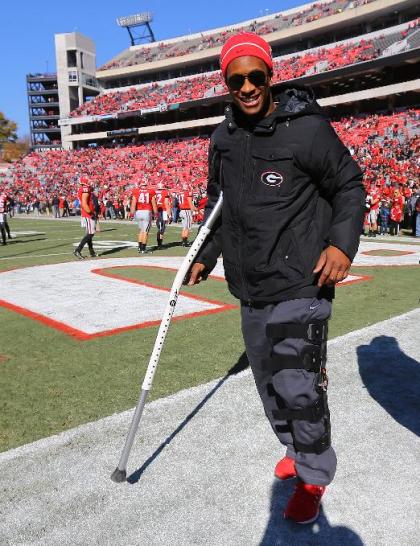Devaluing of RBs could make obvious game-changer Todd Gurley into a draft 'steal'
There are draft picks with upside, draft picks with significant upside, and then there are draft picks like Todd Gurley.
The Georgia running back is projected somewhere in the first round, but his talent and the overdone dismissal of rushers in this era has created a situation where he might become the steal of the draft, no matter where he goes.
Gurley would be projected higher if he didn't tear his ACL last November, a crucial caveat for those in the market for his services. But there's another shadow on his position that probably shouldn't be there: the idea that running backs aren't as valuable anymore.

The first back drafted in 2014 was second-rounder Bishop Sankey, and he had as many fumbles as touchdowns as a rookie (two). The last runner to be picked in the first round was Trent Richardson in 2012, and we all know how that turned out. The going sentiment is that rushers are disposable and replaceable.
But Gurley's talent is neither.
"They've somewhat devalued the marquee running back," says former Cleveland Browns head coach Butch Davis, who recruited Gurley when he was with North Carolina, "but if you take a look at all the Super Bowl champions, for the most part, there's been a long laundry list of great running backs."
Even last season, amid the fervor over the mobile quarterback and the multi-skilled tight end, the teams with the pile-moving rushers did the best: the Green Bay Packers with Eddie Lacy, the Dallas Cowboys with DeMarco Murray, the Seattle Seahawks with Marshawn Lynch, and even the New England Patriots with LeGarrette Blount. Playoff teams with smaller or less-talented backs vanished from the postseason quickly – if they got into the playoffs at all.
Gurley is squarely in the mold of the top rushers. His NFL.com draft profile compares him to Lynch, and Davis compares favorably with the greatest Georgia legend, Herschel Walker, who Davis saw up close when he was an assistant with the Cowboys.
"I'm a huge Todd Gurley fan," Davis says. "I watched him in high school and he was a great kid. Super kid. Terrific overall athlete. He could have been a world-class hurdler."
Davis isn't alone. One NFL scout told NFL.com Gurley is the best draft prospect at his position since Adrian Peterson.
The stats bear that out. Gurley averaged 6.4 yards per carry at Georgia over parts of three seasons. He also missed time because of a suspension for taking autograph money, but that means a lot of the usual wear on college rushers won't affect him as much.
Peterson, by way of comparison, averaged 5.4 yards per carry over his three-year career – albeit with more attempts because of a 339-carry freshman season at Oklahoma. In their final seasons, Peterson averaged 5.4 yards per carry over 188 attempts and Gurley averaged 7.4 over 123 attempts.
"He's got home run speed," says Davis. "If he gets into the second level, he can run away from all the speed on defense."
It's actually a very good draft overall for running backs. Wisconsin's Melvin Gordon is considered better than Gurley in some circles, in part because of stunning performances like his 408-yard masterpiece in only three quarters against Nebraska last year. Indiana's Tevin Coleman, Nebraska's Ameer Abdullah, Miami's Duke Johnson, Boise State's Jay Ajayi and Alabama's T.J. Yeldon may all be as good or better than any back from last year's crop.
Gurley, however, is the rare combination of size (6-foot-1, 222 pounds) and speed that stands up in any draft class. There aren't many offensive players in the sport with his kind of gifts. So although the running back position has fallen from favor somewhat, it's easy to find teams that could use someone like Gurley. The San Diego Chargers without Ryan Mathews, like the Detroit Lions without Reggie Bush and the Carolina Panthers without DeAngelo Williams, all could drop Gurley into their starting lineup immediately and see an upgrade. Keep in mind the Indianapolis Colts got a bump in their running game by adding Frank Gore, who had two ACL tears in college and will be 32 in May.
What should make fans of poorer teams shudder is how Gurley's injury may drop him to the lower part of the first round. That would make him available to teams like the New England Patriots and the Cowboys – a rich-get-richer scenario where current powers benefit from lesser teams not having a running back like Gurley. The needs among the NFL's dregs are more diverse, and so many will pass on Gurley and Gordon in favor of linchpin players on the lines or at quarterback. That could end up making the disparity between the haves and have-nots even wider.
It feels like forever since star running backs went atop the first round, but it hasn't been all that long. Peterson and Lynch both went in the top 12 in 2007, and it was clear right away that they were potential franchise players. So it might be with Gurley and Gordon. Neither is likely to go as high as the top 12, but perhaps both are that good.
